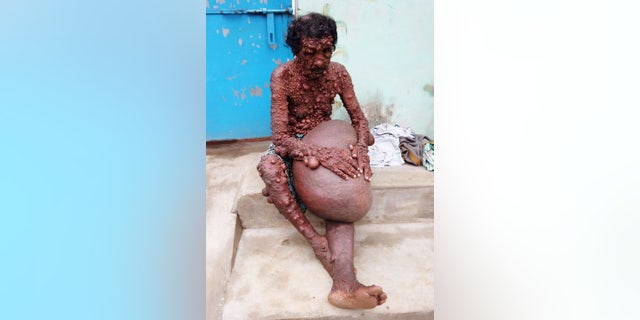

Fox News Flash top headlines for Jan. 6
Fox News Flash top headlines for Jan. 6 are here. Check out what’s clicking on Foxnews.com
A man in India whose rare genetic condition has left him covered in thousands of tumors and with an extremely swollen leg claims he is treated worse than “a dirty stray animal” by neighbors and strangers who don’t understand his condition.

Diwaker Bisoye said he is treated worse than "a dirty stray animal" by people who don’t understand his condition.
(SWNS)
Diwaker Bisoye, 65, told SWNS that the growths first started with a few small lumps around 15 years ago. He was diagnosed with multiple neurofibromatosis, which doctors told him could partially be treated with multiple surgeries, but care isn’t available in his small village. The condition causes tumors to form on nerve tissues, and in Bisoye's case has also caused his leg to swell to a massive 56 pounds.
“People ridicule me directly,” he told SWNS. “They stare at me and avoid me. Most people act very [strangely] around me. No one likes looking at me or being near me.”
Bisoye claims misinformed people believe he will infect them and that he’s been unemployed for 15 years because of it.
“Landlords don’t want me living in their property or ask me to leave when people complain about my condition,” he told SWNS.

In addition to the thousands of tumors, the condition has also caused his leg to swell to a massive 56 pounds.
(SWNS)
A woman in Alabama who was also diagnosed with neurofibromatosis said she has spent the majority of her life dodging looks and comments from strangers who also have misconceptions about her condition. Ashley Jernigan, who said her mother and grandmother both also had neurofibromatosis, said she hasn’t had her tumors removed out of fear that they will grow back larger.
“With this condition, you can still live life like any other normal person,” she told Caters News Agency. “It’s just the bullying you have to deal with. It takes a strong person to overcome what people say. It’s hard, it’s really rough and depressing.”
Source: Read Full Article